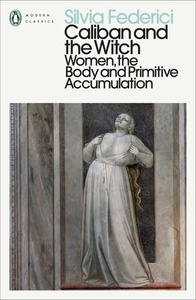You need to sign in or sign up before continuing.
Take a photo of a barcode or cover
informative
3,9 estrelas so pq foi bem denso no começo e pelo assunto ser tão pesado ne
dark
informative
sad
medium-paced
Fascinating (and often infuriating) read. Federici looks at the beginnings of capitalism and specifically the Marxist concept of "primitive accumulation" through a feminist lens, showing how women's bodies and labor were expropriated, devalued, and made part of the support structure undergirding capitalist production. She outlines the means of this expropriation, such as religious persecution and witch hunts, and explores how this specific aspect connects with other forces like colonialism and slavery that were shaping society at the time. There are plenty of myths and oversimplified narratives floating around about this period in history, and Federici debunks several, including the idea that the witch hunts were a leftover remnant of medieval peasant superstition (they were in fact encouraged and often perpetrated by the state). She also discusses the many peasant movements against feudalism that sure look a lot like communism and anarchy, centuries before those ideas officially came on the scene, and how capitalism, far from a natural evolution to a more progressive mindset, was more of a counterrevolution against these peasant revolts.
I have read some critiques of the historicity of some elements of this book (e.g. possible inflation of the numbers of those actually killed during the witch hunts); however, overall the central arguments seem to hold up quite well. Definitely recommended to anyone looking for a thoroughgoing examination of how we got where we are now, that takes into account some of the elements (gender, race, etc) often overlooked in traditional Marxist thought.
I have read some critiques of the historicity of some elements of this book (e.g. possible inflation of the numbers of those actually killed during the witch hunts); however, overall the central arguments seem to hold up quite well. Definitely recommended to anyone looking for a thoroughgoing examination of how we got where we are now, that takes into account some of the elements (gender, race, etc) often overlooked in traditional Marxist thought.
challenging
dark
informative
reflective
sad
slow-paced
I loved this book, especially Federicis meticulous historical analysis, the call backs to Marx and Foucault while not neglecting criticism of the two. The intersectional approach was great I am thinking of the sections about poor colonisers and native people as opposed to rich colonisers. All in all this book is essential reading for a feminist understanding of history and one that brings to the forefront and issue that is underrepresented in other historical accounts.
absolutely fantastic analysis of Marx’s theory of primitive accumulation through a feminist lens, using the witch-hunts of Western Europe & South America primarily… love love love
informative
reflective
slow-paced
Este es un libro que todxs deberíamos leer en la vida y que debería dejarse en las escuelas.







